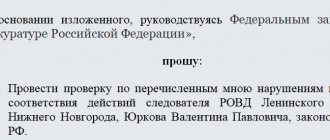Bookmarked: 0
An act of complaint against the actions of an official reflects violations of current legislative norms by an employee of a government agency. All citizens of the Russian Federation have the right to apply to the prosecutor's office or court to defend their civil rights. A claim may be made for an unlawful act or omission.
However, in order for a complaint against a civil servant to be accepted for consideration, it must be properly filed. Is there a uniform template and rules for registration, are anonymous applications accepted, and where should the completed application be sent? Below you will find all the answers.
General information
A complaint is filed if the freedoms and rights of a citizen or group of citizens were violated by a government representative in the performance of official duties. Moreover, it does not matter whether the job is permanent or temporary. The acting person also falls into this category.
Since the civil service is an extremely responsible matter, the activities of employees must be carried out strictly according to regulations and in accordance with the Code of Administrative Offenses and the Criminal Code of the Russian Federation. But if an employee neglects to comply with current regulations, a certain amount of punishment should be applied to him. For this purpose, a claim is filed with the prosecutor’s office or court.
A complaint document against the actions of an official is drawn up in cases where the employee:
- neglected the rights and freedoms of a particular citizen (citizens);
- specifically created obstacles for a specific person to exercise his rights and freedoms;
- illegally brought a citizen to administrative or criminal liability;
- illegally imposed any obligation on a citizen;
- did not act when it was necessary to perform his official duties.
A completed form of complaint against the actions of an official should be sent to the prosecutor's office. There are also other options - filing a claim in court or filing a claim with a higher authority that controls the official. Sometimes victims have to send a complaint to the Ombudsman. Such situations require legal advice.
It is important to comply with legal deadlines when filing a claim, otherwise it will be ignored. The actions of an official have a statute of limitations. According to the law, a complaint must be filed no later than three months from the date the incident occurred. Appeals received by the prosecutor's office, court or other body are considered within 10-15 days.
The exact response time depends on the type of authority. Sometimes employees of the prosecutor's office or chancellery need more time to make a decision, and then the period increases. Employees are required to notify the applicant of this by telephone or mail. That is why applications to government agencies must contain the citizen’s contacts and residential address. Anonymous complaints against officials remain unanswered, since employees simply will not be able to notify the applicant of the decision.
Result of appeal
When considering a complaint, the legality and validity of the decision made is checked (clause 8, part 2, article 30.6 of the Code of Administrative Offenses of the Russian Federation). And yet, what exactly can the complainant count on?
One of four possible solutions is possible (Part 1 of Article 30.7 of the Code of Administrative Offenses of the Russian Federation):
- to leave the resolution unchanged and the complaint unsatisfied;
- on changing the resolution, unless this increases the administrative punishment or otherwise worsens the position of the person in respect of whom the resolution was made;
- on the cancellation of the decision and on the termination of the proceedings in the case in the presence of at least one of the circumstances provided for in Articles 2.9 (due to insignificance), 24.5 (in the presence of circumstances excluding the proceedings in the case) of the Code, as well as in the absence of proof of the circumstances on the basis of which the decision was made ;
- on the cancellation of the decision and on the return of the case for a new consideration to the body, official, authorized to consider the case, in cases of significant violation of the procedural requirements provided for by the Code, if this did not allow a comprehensive, complete and objective consideration of the case.
note
An organization can go directly to court or challenge decisions, actions (inaction) of a body, organization, person vested with state or other public powers, to a higher authority, organization in the order of subordination, or from a higher person in the order of subordination, or use other out-of-court procedures for resolving disputes ( Part 1 of Article 218 of the Code of Administrative Proceedings).
Information on the last option: the procedural requirements are established by chapters 24–29 of the Code.
The decision on the complaint is announced immediately after it is made. A copy of the decision on the complaint, within up to three days after its issuance, is handed over or sent to the legal representative of the legal entity in respect of whom the decision was made in the case (Parts 1, 2 of Article 30.8 of the Code of Administrative Offenses of the Russian Federation).
How to compose correctly
A unified form of complaint against the actions of an official has been approved. This means that business paper must contain mandatory details, without which it will not be considered correct. The form of a complaint against the actions of an official is filled out in accordance with the required content.
The unchanged sections include the following points of the document structure:
- Information about the authority where the application is sent (name and address of the court or prosecutor's office).
- Information about the applicant and his contact details (full name, residential address, telephone numbers and mail for communication).
- Information about the unlawful action of an official.
- Links to articles of the Code of Administrative Offenses and the Criminal Code of the Russian Federation that were violated.
- Citizen's request (for example, criminal prosecution).
- Compiler's signature.
- Document creation date.
A detailed and specific description of a case of violation of the law or the rights of a specific citizen by a person in the performance of official duties will add weight to the complaint. In order not to distract the investigating authority with verbosity, follow the algorithm:
- Indicate the date when the incident occurred.
- Give a reason, support it with references to articles of the Code of Administrative Offenses and the Criminal Code of the Russian Federation.
- List the attachments to the complaint (evidence, etc.).
A citizen’s appeal can be written by hand or prepared in electronic format. When filling out handwritten documents, the main requirement is legible handwriting of the compiler. It is also necessary to observe literacy - it is forbidden to submit a complaint about the actions of an official with errors.
If the text of the claim is printed on a computer, you should carefully proofread it.
Often, compilers are in a hurry and miss typos. A typo is the same mistake as a spelling mistake. And if a typo was made, for example, in the last name or first name of a character, then it becomes a factual error. If the information contained in the application does not correspond to the facts, the citizen will not be provided with assistance in resolving his issue.
The originator must sign the completed complaint template against the actions of an official. Only handwritten signatures are accepted. Even if the text was entered via computer, the form must be printed. Below the signature is the date the request was created. This completes the filing of the complaint.
Drawing up a document
How to write a complaint against an employer to the prosecutor's office?
Complaint against bailiff to management
SMS spam how to fight?
How to file a complaint with the Ministry of Health?
How to file a complaint about the inaction of a bailiff
How to file a complaint on the State Services portal?
Despite the fact that a complaint about unlawful actions of an official does not have a set form, when drawing it up, the following structural and content features should be adhered to:
- The “header” of the document contains the following information: the full name of the authority to which the complaint will be submitted, details of the official in whose name it is filed, the address of its location, the number of the site (if the court) and other necessary information. Next, the applicant’s details are indicated, namely: last name, first name, patronymic, permanent residence address, contact information (telephone, email address);
- The title of the document, namely “Complaint about unlawful actions of an official”;
- The main part describes the essence of filing a complaint, the violation committed by the official, the consequences for the applicant, an attempt to resolve the situation in other instances, deadlines, dates, addresses and other important information for considering the complaint;
- In the next part, it is important to indicate as many legislative references as possible confirming the unlawful nature of the official’s actions and the presence of violations of the rights and interests of the applicant;
Despite the fact that the indication of this paragraph is not mandatory, its presence will significantly speed up the procedure for considering the claim.
- Part of the requirements. Here, based on current legislation, specific requirements should be presented to the authority regarding ways to suppress the unlawful activities of a particular official. Such requirements may include: organizing an audit of the employee’s activities, applying penalties in accordance with current legislation, confiscation of documentation, removal from office, etc.;
- The next part of the “Appendix” indicates all the documents that will be attached to the completed complaint as evidence and substantiation;
- At the very end, the applicant’s personal signature is affixed, and the date of submission of the application is also indicated.
As for the rules that must be followed when drawing up a document, they relate to the following:
- the entire descriptive part of the complaint must be in a business style;
- the text should be as easy as possible for perception and understanding, it should not contain long cumbersome sentences, unclear words, abbreviations, obscene language and other words with a sharply expressive connotation;
- the text must be free of obvious grammatical, syntactic and stylistic errors, corrections and deletions;
- The text should present only facts and their legislative and documentary support. There should not be any “gag” or expression of a subjective rather than an objective point of view in the complaint.
Form of complaint against the actions of an official
You can download a complaint about the actions of an official using the attached link. The proposed template is compiled in accordance with the requirements of the current law relating to legal proceedings.
A prepared complaint against a person’s actions during execution can be submitted during a personal visit to the court office or prosecutor’s office. The second method is to send a registered letter with an inventory of the value. You can submit a claim only on paper. Sending by email is not possible.
Sample complaint to the prosecutor about the investigator’s inaction
To the prosecutor of Novokuybyshevsk FULL NAME1 ADDRESS1 TELEPHONE1
from the lawyer of the law firm “Antonov and Partners” Dragunov M.E., reg. No. 63/3215 in the register of lawyers of the Samara region Address for correspondence: 443080, Samara, Karl Marx Avenue, 192, office. 619, tel. 8-927-734-08-16 email address
to protect the interests of FULL NAME2, DOB DATE1
Complaint (in accordance with Article 124 of the Code of Criminal Procedure of the Russian Federation)
FULL NAME2 An application was submitted to the Novokuibyshevsk prosecutor's office containing a request to conduct a prosecutorial review and take prosecutorial response measures. FULL NAME2 indicated in the statement that on January 11 at approximately 15:00 in the parking lot at the address: ADDRESS2 there was a verbal conflict with a woman unknown to him. He asked to leave your phone number or not to park your car. The woman said in a raised voice that she would call the police, to which FULL NAME2 replied that it was her right and went home. On January 12 at approximately 12:00, a police officer, FULL NAME 3 (phone number 89371802622) called him and asked him to come to the parking lot to talk about the conflict. Arriving at the parking lot, he saw an unfamiliar car in which there were three men in civilian clothes. After getting out of the car, they showed their IDs. They told him to take him into the car to talk. After FULL NAME2 got into the car, he was taken to the police department at the address: ADDRESS3. At the police department, he was questioned by two officers: Major FULL NAME4 and FULL NAME3, who turned out to be the husband of the woman with whom he had argued the day before in the parking lot. Major FULL NAME4 interviewed him for about an hour. FULL NAME3 took a picture of him on his phone, took his phone and went with him to another office for about 30 minutes. After the interview, he was taken outside and left, leaving him alone in the city of Novokuibyshevsk without money for the return trip. At the same time, FULL NAME3 repeatedly expressed various threats of physical violence towards him. He said that he would put him on a stretch and beat him. He also said that he would break his kneecap, tie weights to his legs and throw him into an ice hole, meet his wife and beat and kill his dog. On 01/21/2021, based on the results of consideration of this application, the Prosecutor’s Office of the city of Novokuibyshevsk sent a response, according to which: “On 01/11/2021, the Department of Internal Affairs of Russia for the city of Novokuibyshevsk received an application FULL NAME5, about bringing to criminal responsibility a man who caused her bodily harm, damaged her vehicle means and threatened with physical violence, which is registered in KUSP No. 540 dated January 11, 2021. The investigation into this application was entrusted to employees of the Department of the Department of Internal Affairs of Russia for the city of Novokuibyshevsk. During the inspection, the need arose to interview you in order to establish your involvement in the events that took place, in connection with which you were taken to the Department of Internal Affairs of Russia in Novokuybyshevsk on January 12, 2021, where the senior detective officer of the ESD FULL NAME4 selected an explanation on the merits of the inspection. On 01/12/2021, the specified material was sent, according to jurisdiction, to OP No. 9 of the Russian Ministry of Internal Affairs for the city of Samara for making a procedural decision. Interested parties will be notified of the results of the inspection and the procedural decision made by the body that conducted the inspection. Due to the requirements of Art. Art. 144, 145 of the Code of Criminal Procedure of the Russian Federation, Federal Law dated 02/07/2011 No. 3-FZ “On the Police”, employees of internal affairs bodies are authorized to conduct checks on applications from citizens, select explanations, deliver citizens to the territorial internal affairs body, Thus, violations of the requirements of federal legislation when the inspection at the request of FULL NAME3 was not established. Copies of your appeals regarding the arguments about unlawful actions of employees of the Department of Internal Affairs of Russia for the city of Novokuibyshevsk were sent to the investigative department for the city of Novokuybyshevsk of the Investigative Directorate of the Investigative Committee of Russia for the Samara Region for consideration. In connection with the above, there are no grounds for taking prosecutorial response measures.”
We consider this response from the Novokuybyshevsk prosecutor’s office to be formal and not in accordance with the legislative requirements for the consideration of citizens’ appeals by the prosecutor’s office. Based on this statement, the actions of an employee of the Novokuybyshevsk police department, FULL NAME3, contain signs of a crime under Part 1 of Article 285 of the Criminal Code of the Russian Federation - the use by an official of his official powers contrary to the interests of the service, if this act was committed out of selfish or other personal interest and entailed a significant violation of the rights and legitimate interests of citizens or organizations or interests of society or the state protected by law, as well as Part 1 of Article 286 of the Criminal Code of the Russian Federation - the commission by an official of actions that clearly go beyond the scope of his powers and entailed a significant violation of the rights and legitimate interests of citizens or organizations or legally protected interests of society or the state. The actions of a police officer, FULL NAME 3, in terms of the illegal detention and seizure of a mobile phone, FULL NAME 2, without any documentation of these actions (detention protocol, inspection report, etc.) are qualified as a crime under Part 1 of Article 285 of the Criminal Code of the Russian Federation. The actions of the police officers, in particular, FULL NAME3, constitute detention, since in the literal sense of the provisions enshrined in Articles 2, 45 and 48 of the Constitution of the Russian Federation, the right to receive legal assistance from a lawyer is guaranteed to every person, regardless of his formal procedural status, including including recognition as a detainee and a suspect, if the authorized authorities have taken measures in relation to this person that actually limit freedom and personal integrity, including freedom of movement - retention by official authorities, forced delivery or delivery to the bodies of inquiry and investigation, detention in isolation without any - contacts, as well as any other actions that significantly restrict freedom and personal integrity (Resolution of the Constitutional Court of the Russian Federation dated June 27, 2000 No. 11-P “In the case of verifying the constitutionality of the provisions of Part 1 of Article 47 and Part 2 of Art. 51 of the Code of Criminal Procedure of the RSFSR in connection with the complaint of citizen V.I. Maslov.” Since FULL NAME 2 was forcibly taken to the police department in the police car, he was detained. During the detention and subsequent questioning, FULL NAME2, no rights were explained, including the right to have a defense lawyer, and the opportunity to consult with a defense lawyer was not provided. In addition, during the detention and questioning, his mobile phone was confiscated and examined from FULL NAME2. According to Part 1 of Article 89 of the Code of Criminal Procedure of the Russian Federation, in the process of proving it is prohibited to use the results of operational investigative activities if they do not meet the requirements for evidence by this Code. According to Part 8 of Article 164 of the Code of Criminal Procedure of the Russian Federation, during the investigative action a protocol is kept in accordance with Article 166 of the Code of Criminal Procedure of the Russian Federation. According to Parts 2,4 of Article 177 of the Code of Criminal Procedure of the Russian Federation, inspection of traces of a crime and other discovered items is carried out at the place of production investigative action, except for the cases provided for in Part 2 of Article 177 of the Code of Criminal Procedure of the Russian Federation. Everything discovered and seized during the inspection must be presented to the participants of the inspection. Thus, in relation to FULL NAME2, the following violations: failure to comply with the order of detention, which resulted in a violation of his constitutional right to freedom of movement; failure to comply with the procedure for examining a mobile phone, which resulted in a violation of his constitutional right to privacy of correspondence. These violations of constitutional rights are significant. We believe that these illegal actions were committed by a police officer, FULL NAME3, out of “other personal interest.” Under it in paragraph 3 of paragraph 16 of the Resolution of the Plenum of the Supreme Court of the Russian Federation of October 16, 2009 No. 19 “On judicial practice in cases of abuse of power and exceeding official powers”, it is understood as the desire of an official to benefit from a non-property nature, due to such motives, such as careerism, nepotism, the desire to embellish the actual situation, receive a mutual favor, enlist support in resolving any issue, hide one’s incompetence, etc. Since Full Name 3 is the wife of a woman with whom Full Name 2 had a conflict in the parking lot the day before, He had a desire to resolve this conflict using his official position and in this way punish his wife’s offender, especially since she herself threatened to call the police, meaning to win over her husband, who is a police officer.
Also, the actions of the police officer FULL NAME3 contain signs of a crime under Part 1 of Article 286 of the Criminal Code of the Russian Federation. The presence of signs of a crime under Part 1 of Article 286 of the Criminal Code of the Russian Federation in the actions of the specified police officer is confirmed by the explanations of the Plenum of the Supreme Court of the Russian Federation contained in paragraph 19 of the Resolution No. 19 of October 16, 2009 “On judicial practice in cases of abuse of official powers and on exceeding official powers": in contrast to the responsibility provided for in Article 285 of the Criminal Code of the Russian Federation for committing actions (inaction) within one’s competence contrary to the interests of the service, liability for exceeding official powers (Article 286 of the Criminal Code of the Russian Federation) occurs if an official commits active actions, clearly beyond the scope of his powers, which entailed a significant violation of the rights and legitimate interests of citizens or organizations or legally protected interests of society or the state, if the official was aware that he was acting outside the powers assigned to him. Exceeding official powers can be expressed, for example, in the commission by an official in the performance of official duties of actions that: relate to the powers of another official (superior or equal in status); can be committed only in the presence of special circumstances specified in the law or regulations (for example, the use of weapons against a minor, if his actions did not create a real danger to the lives of other persons); committed by an official alone, but can only be carried out collectively or in accordance with the procedure established by law, in agreement with another official or body; no one has the right to commit under any circumstances. According to Part 4 of Article 164 of the Code of Criminal Procedure of the Russian Federation, during investigative actions the use of violence, threats and other illegal measures is unacceptable, as well as creating a danger to the life and health of the persons participating in them. The specified imperative rule was violated by a police officer FULL NAME3. Namely, they were threatened with physical violence and harm to health, FULL NAME2. It is also noteworthy that FULL NAME2 was left on the street in another city in winter without funds for the return journey.
According to Part 2 of Article 37 of the Code of Criminal Procedure of the Russian Federation, during pre-trial proceedings in a criminal case, the prosecutor is authorized, among other things, to check the fulfillment of the requirements of the federal law when receiving, registering and resolving reports of crimes, as well as to issue a reasoned decision on sending the relevant materials to the investigative body or body of inquiry to resolve the issue of criminal prosecution based on violations of criminal law identified by the prosecutor. The response from the prosecutor's office is formal and issued with virtually no consideration of the applicant's arguments. In fact, the report of illegal and unfounded detention and threats of grievous harm to health by police officers was ignored. Neither FULL NAME2 himself, nor his defense lawyer Dragunov M.E. Until now, in violation of the requirements of the law, they have not been familiarized with the inspection materials at the request of FULL NAME5. Despite the fact that, based on the response from the prosecutor's office of the city of Novokuybyshevsk, copies of the appeals were sent to the investigative department for the city of Novokuybyshevsk, until now FULL NAME2 has not been called there to give explanations. He did not receive any notices or notifications regarding this inspection material, although a month had already passed since the date of sending a copy of his application. Thus, there is inaction of the investigators of the investigative department for the city of Novokuibyshevsk. According to Part 1 of Article 123 of the Code of Criminal Procedure of the Russian Federation, the actions (inaction) of the prosecutor can be appealed in the manner established by the Code of Criminal Procedure of the Russian Federation by participants in criminal proceedings. According to Parts 1-3 of Article 124 of the Code of Criminal Procedure of the Russian Federation, the prosecutor considers the complaint within 3 days from the date of its receipt. Based on the results of consideration of the complaint, the prosecutor makes a decision to fully or partially satisfy the complaint or to refuse to satisfy it. If a complaint filed in accordance with Part 2 of Article 123 of the Code of Criminal Procedure of the Russian Federation is satisfied, the resolution must indicate the procedural actions carried out to speed up the consideration of the case and the deadlines for their implementation. The applicant must be immediately notified of the decision made on the complaint and the further procedure for appealing it. According to Article 26, paragraphs 1, 2 of Article 27 of the Federal Law “On the Prosecutor's Office of the Russian Federation”, the subject of supervision is the observance of human and civil rights and freedoms by federal executive authorities, the Investigative Committee of the Russian Federation, representative (legislative) and executive bodies subjects of the Russian Federation, local government bodies, military control bodies, control bodies, their officials, subjects of public control over ensuring human rights in places of forced detention and assistance to persons in places of forced detention, as well as management bodies and managers of commercial and non-profit organizations. The prosecutor's office does not replace other government bodies and officials who monitor the observance of human and civil rights and freedoms, and do not interfere in the operational and economic activities of organizations. The prosecutor's inspection of compliance with human and civil rights and freedoms is carried out taking into account the provisions of paragraphs 2 - 15 of Article 21 of the Federal Law “On the Prosecutor's Office of the Russian Federation”. When performing the functions assigned to him, the prosecutor: considers and verifies statements, complaints and other reports of violations of human and civil rights and freedoms; explains to victims the procedure for protecting their rights and freedoms; takes measures to prevent and suppress violations of human and civil rights and freedoms, bring to justice those who violated the law, and compensate for the damage caused; uses the powers provided for in Article 22 of the Federal Law “On the Prosecutor's Office of the Russian Federation”. If there are grounds to believe that the violation of human and civil rights and freedoms has the nature of a crime, the prosecutor takes measures to ensure that the persons who committed it are subject to criminal prosecution in accordance with the law.
Based on the above and guided by Articles 123, 124 of the Code of Criminal Procedure of the Russian Federation, the Federal Law “On the Prosecutor’s Office of the Russian Federation”,
Ask:
Consider the application of citizen FULL NAME2 on the merits and conduct a prosecutorial review; Conduct an investigation into the inaction of employees of the investigative committee for the city of Novokuybyshevsk, which resulted in the absence of any pre-investigation verification of the statement, FULL NAME2, and apply liability measures against the perpetrators.
Attachment: warrant from lawyer M.E. Dragunov.
Defender FULL NAME2 ______________ lawyer Dragunov M.E.
Hereinafter, in order to maintain attorney-client privilege, the names and surnames of the participants in the case have been changed.
What to pay attention to
In order for a contract of complaint against the actions of an official to be accepted for consideration, it must comply with this type of paper. The use of obscene language and emotional statements is prohibited. The style of presenting the essence of the problem and the applicant’s demands should be restrained and dry.
It is prohibited to include anything other than facts in a complaint against an official. Each point must be supported by evidentiary material (for example, witnesses, video recording, audio recording, etc.). Speculation and conjecture in the complaint will be regarded as slander and insult to a person in the performance of official duties, and this is a crime. A citizen who allows himself to slander or insult a civil servant will be prosecuted.
Don't miss the appeal deadline
In general, a complaint against a decision in a case of an administrative offense can be filed within 10 days from the date of delivery or receipt of a copy of the decision (Part 1 of Article 30.3 of the Code of Administrative Offenses of the Russian Federation). After this period, the resolution is considered to have entered into legal force. In this case, it can only be appealed through the court (Part 1 of Article 30.13 of the Code of Administrative Offenses of the Russian Federation).
However, the deadline for appeal, missed for a valid reason, can be restored. To do this, you must submit a petition (Part 2 of Article 30.3 of the Code of Administrative Offenses of the Russian Federation).
The most important thing is not to make a mistake when calculating the 10-day period.
The calculation of deadlines is regulated by Article 4.8 of the Code. From Part 1 of this article it follows that the period calculated in days and days is not the same thing. If the period is calculated in days and its end falls on a non-working day, then the last day of the period is considered to be the first working day following it (Part 3 of Article 4.8 of the Code of Administrative Offenses of the Russian Federation). But for a period calculated in days, such “indulgence” (usual for an accountant) is not provided.
The 10-day period begins the next day from the date of delivery or receipt of a copy of the resolution (Part 1 of Article 4.8 of the Code of Administrative Offenses of the Russian Federation).
Let's assume you received the resolution by mail on November 1, 2017. The countdown of the 10-day period should begin on November 2. This means the deadline ends on November 11th. Even though it is Saturday, the last day of the deadline cannot be transferred.










